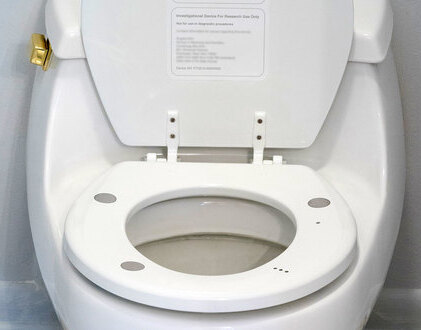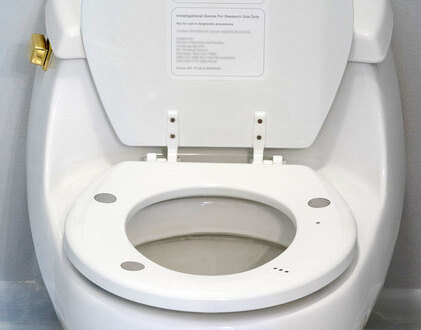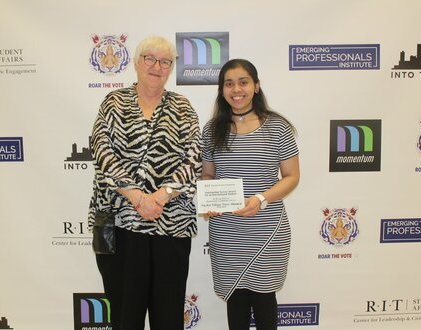News
Breadcrumb
- RIT/
- Borkholder Lab/
- News
-
November 26, 2023
![two American soldiers standing next to each other, one with a rocket launcher on his shoulder. There is debris and heat waves in the air behind them from a recent blast.]()
U.S. Troops Still Train on Weapons With Known Risk of Brain Injury
The New York Times talks to David Borkholder, the Bausch and Lomb Professor in the Department of Electrical and Microelectronic Engineering, about blast exposure.
-
May 27, 2021
![toilet with seat with sensors on it.]()
Smart toilet seat designed to potentially save lives
WHEC-TV talks to David Borkholder, professor in the Kate Gleason College of Engineering and co-founder and head of research and development at Casana.
-
April 28, 2021
![people working on toilet seat prototypes.]()
Alumni join forces to market smart toilet seat
Alumnus Nick Conn’s vision for a one-of-a-kind smart toilet seat that will improve the health of people around the world has made giant leaps toward becoming a reality with the help of one of RIT’s most generous patrons, Austin McChord.
-
February 24, 2021
![two researchers holding toilet seat with sensors embedded on the bottom.]()
Toilet Seat Offers Relief for Heart Patients
ASME.org features David Borkholder, the Bausch and Lomb Professor of Microsystems Engineering, and Nicholas Conn '11, '13 MS (electrical engineering).
-
October 23, 2020
![four researchers posing for photo.]()
Research team wins Catalyst Award in first year of international challenge
David Borkholder, Linwei Wang, Caroline Easton, and Adam Smith, part of RIT's Personalized Healthcare Technology signature research initiative, recently won a Catalyst Award from the National Academy of Medicine for their project, “Improving Health for the Aging through Daily Vital Signs Monitoring.”
-
October 15, 2020
![Toilet Seat and Cellphone viewing health application]()
Joint project receives NIH funding to assess the benefits of AI-enabled toilet seat technology
The New-Medical.Net article reports on the joint project by researchers at Rochester Institute of Technology and the University of Rochester Medical Center (URMC) to reduce re-hospitalization rates for people with heart failure.
-
October 14, 2020
![reseacher posing in lab.]()
RIT, URMC receive grant to study benefits of AI-enabled toilet seat technology
Toilet seats with high-tech sensors might be the non-invasive technology of the future that could help reduce hospital return rates of individuals with heart disease. A joint project by researchers at RIT and the University of Rochester Medical Center will determine if in-home monitoring can successfully record vital signs and reduce risk and costly re-hospitalization rates for people with heart failure. The five-year, $2.9 million venture is funded by the National Institutes of Health.
-
October 9, 2020
![professor in atrium of college.]()
Linwei Wang named new director of RIT’s Personalized Healthcare Technology initiative
Linwei Wang has been named the new director of the Personalized Healthcare Technology signature research initiative at RIT, and Adam Smith has been named Creative Director, a new position with the group.
-
October 7, 2020
![]()
High-tech toilet seat aims to help researchers in Rochester reduce heart disease
WHAM-TV reports on the Fully-Integrated Toilet Seat (FIT Seat) research led by Dave Borkholder, a professor in the Kate Gleason College of Engineering, in collaboration with the University of Rochester Medical Center funded by a new 2.9M grant from the National Institutes of Health (NIH).
-
March 30, 2020
![David Borkholder]()
David Borkholder Inducted into AIMBE College of Fellows
The American Institute for Medical and Biological Engineering (AIMBE) has announced the induction of David Borkholder, Ph.D., Bausch and Lomb Professor, Microsystems Engineering, to its College of Fellows.
-
September 11, 2019
![Graphic drawing of heart.]()
Could a toilet seat help prevent hospital readmissions?
Guest essay by Nicholas Conn '11, '13 MS (electrical engineering), research scientist and founder and CEO of Heart Health Intelligence, published by The Conversation.
-
September 5, 2019
![researcher and professor with toilet seat embedded with sensors.]()
Podcast: Toilet Seat Measures Heart Health
Intersections: The RIT Podcast, Ep. 22: Heart failure costs the U.S. $34 billion a year, with most of those costs due to repeated hospitalization. David Borkholder, RIT’s Bausch and Lomb Professor of Microsystems Engineering, talks with Nicholas Conn, a postdoctoral fellow and founder of Heart Health Intelligence, about a new invention that could help patients easily monitor their health in the privacy of their own bathrooms.
Pagination
Additional News
- October 29, 2020

The Rochester Institute of Technology and the University of Rochester Medical Center (URMC) are planning a clinical trial of AI-enabled toilet seats to determine if vital signs can be monitored to reduce re-hospitalization of heart patients.
- April 1, 2020

Company Closes its $2.2M Seed Round to Support Commercialization of The Heart Seat™
- February 1, 2019

Now, a team at the Rochester Institute of Technology (RIT) in New York has come up with a clever way to get patients with heart failure to track their heart health—let a toilet do it for them.
- January 1, 2019

Nuzhet Nihaar Nasir Ahamed, PhD Student, won the 2019 Outstanding Service Award from RIT's International Students Committee. This award recognizes international students who have made special contributions to campus life at RIT or the Rochester community.
Archive
Biosensors Help Practitioners Collect Patient Data Remotely (October 25, 2017)
Best Poster Award for Jing Ouyang (August 16, 2017)
BlackBox Biometrics Blasts Off With Monitoring Sensors (June 25th, 2015)
Analog Devices Highlights BlackBox Biometrics Wearable Technology in Homepage Story (June 07th, 2015)
Blackbox Biometrics Founder & CTO, Dave Borkholder Talks Concussions and TBI on Tech Nation Radio (February 06th, 2015)
Linx IAS Highlighted In Mini-Documentary on the Verge ( January 07th, 2015)
The Washington Post Explains the roots of the Blast Gauge System (August 21th, 2014)
Invisible Wounds (March 23rd, 2014)
The Blast Gauge featured: Neurology and the Military – 5 new things (February 1st, 2013)
Military Expands Brain Injury Blast Detector Pilot to More Troops (October 18th, 2012)
DARPA Blast Gauge quantifies blast exposure, leads to advancements in countering TBI (May 21th, 2012)
Army device will gauge blast hits on soldiers (July 19th, 2011)
DARPA to field Blast Gauge to address TBI threat (June 13th, 2011)
Blast Gauge Delivers Critical Data (April 1st, 2011)











